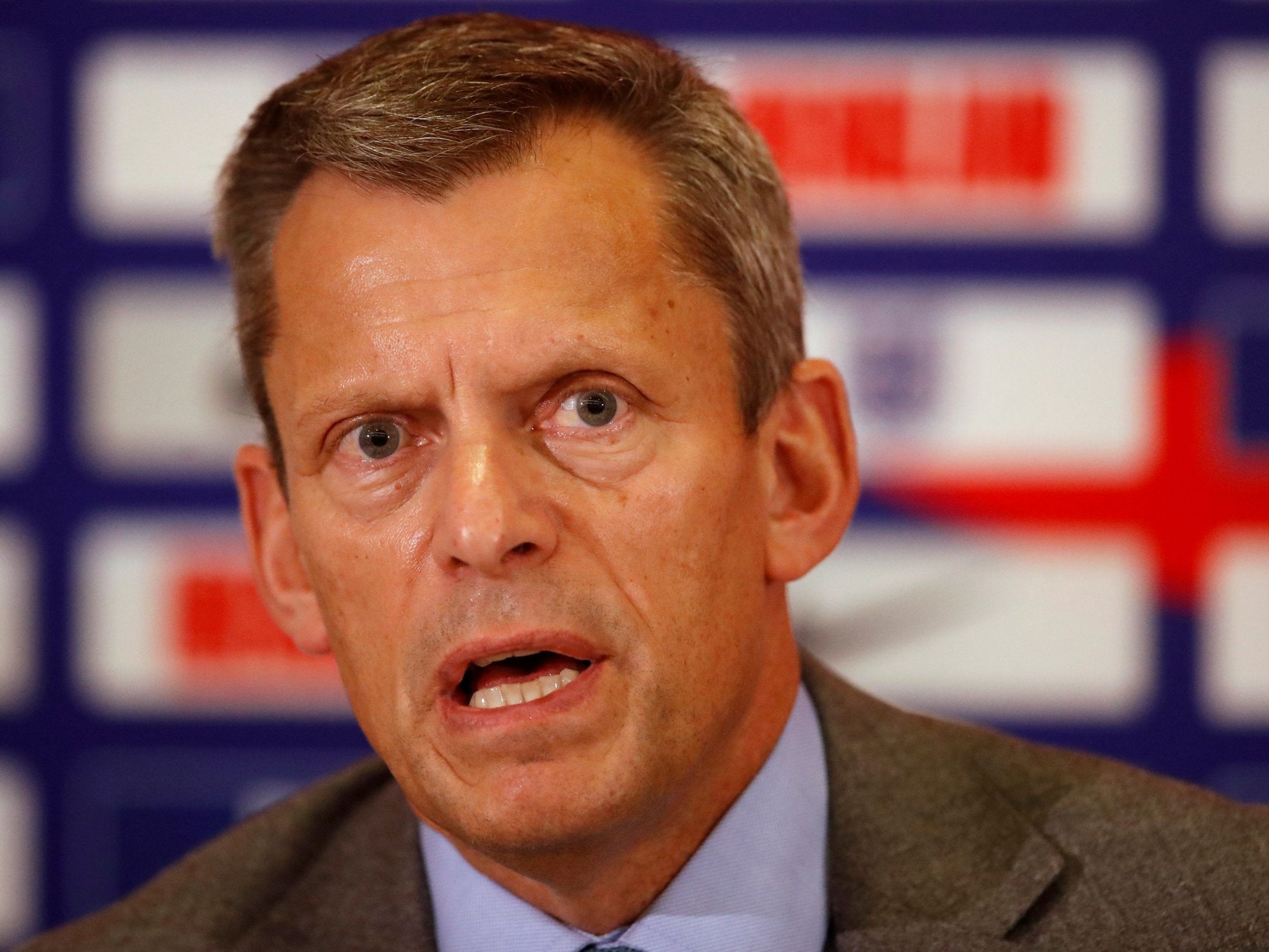Martin Glenn leaves the FA after surprising success with England on the field, yet painful memories off it
The outgoing chief executive will not look back fondly on how he handled the racism scandal involving former England Women’s manager Mark Sampson and players Eni Aluko and Drew Spence

Martin Glenn will leave the Football Association after overseeing the most successful era in living memory for the England teams, although questions will remain about how much that is down to him, especially given the crises that affected other aspects of his tenure at the top of the English game.
There is no doubt that the last few years have marked what the FA on Thursday described as “an unprecedented period of success” for England teams. England won the Under-17 and Under-20 World Cups last year, before the men’s senior side reached the semi-finals of this year’s competition. The women’s side reached the semi-finals of the 2015 World Cup and are set for another strong performance at next year’s World Cup in France.
Certainly the England teams have benefited from the sense of a shared identity that they have lacked before, as well as the vindicated decision to replace Sam Allardyce with Gareth Southgate in October 2016. Generations of Glenn’s predecessors were accused of presiding over more underachievement and drift with the England national team, and he certainly cannot be accused of that.
But it was one of the England teams - the senior women’s side - that brought about the most painful episode of Glenn’s tenure. The Mark Sampson scandal, which dominated the second half of 2017, severely damaged the FA’s credibility on rooting out racism in English football. The FA failed to react properly when England players Eni Aluko and Drew Spence accused manager Mark Sampson of racial abuse.
Aluko was offered an £80,000 settlement by the FA, but half of that was withheld, with Aluko alleging the FA had asked her to publicly state that they were not institutionally racist before she would get the full payment. Glenn denied this, but Aluko said it was “bordering on blackmail”.
Glenn was eventually forced to apologise to Aluko and Spence on behalf of the FA after a third independent investigation established that Sampson had racially abused the pair with what was generously described as “ill-judged attempts at humour”. Sampson had asked Spence how many times she had been arrested, and told Aluko to make sure her Nigerian family did not infect others with Ebola if they attended a match at Wembley. Damian Collins, chair of the House of Commons’ digital, culture, media and sport select committee called on Glenn to resign.
Glenn was also forced to apologise in March of this year when he compared the star of David with the swastika, while trying to explain that he did not want any political or religious symbols on football shirts. Glenn was talking about the FA's opposition to all political symbols on shirts, and ran off a rather ill-judged list of things he would not want to see, even including a reference to Robert Mugabe. The Jewish Leadership Council described conflating the star of David with the swastika as "offensive", and Glenn swiftly had to apologise "for any offence" caused.
And yet this final season has left Glenn engaged in two frustratingly perennial FA concerns: how to make money, and the balance of power with the Premier League. Glenn supported the £600m sale of Wembley to Fulham owner Shahid Khan, but failed to get it over the line because of a lack of support from elsewhere in the FA. The collapse of that deal left questions over the FA’s long term financial plan, and whether they had a way to fund grassroots football rather than just selling their biggest asset to a foreign billionaire.
Although Glenn’s era has been marked by the surprising successes of England teams, he wanted to leave another legacy to English-qualified players, by expanding their spaces in squads after Brexit. Glenn is currently involved in a public dispute with the Premier League over his plans to reduce the number of permitted foreign players allowed in each team’s 25-man squad. Glenn is proud of his plan and believes it will strengthen the English game, but by running into the political power of the Premier League, he is being reminded once again of the power balance within English football.
Subscribe to Independent Premium to bookmark this article
Want to bookmark your favourite articles and stories to read or reference later? Start your Independent Premium subscription today.

Join our commenting forum
Join thought-provoking conversations, follow other Independent readers and see their replies